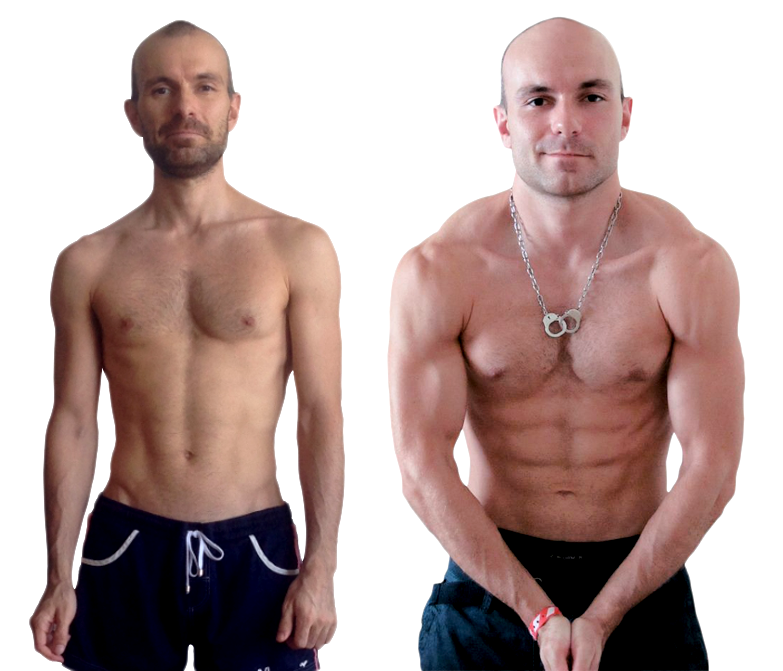How Often Should You Train To Build Muscle? [Data-Driven]
According to scientists, novice and intermediate lifters should train 2-3 days per week, whereas and advanced trainers should aim for 4-5 days per week
![How Often Should You Train To Build Muscle? [Data-Driven]](png/how-often-workout-muscle-gain-2.png)
In my 20+ years as a lifter and a coach, I've seen this topic come up again and again.
How often should you work out to build muscle?
I'll tell you here based on the latest science and my own experience training and coaching clients.
Why should you listen to me?
I’ve been a lifter and a coach for 20 years, and a trainer for the Canadian Forces.
I have a B.Sc in exercise science and a PhD in Public Health/Epidemiology (health statistics). I’ve helped about 10,000 people get in shape 1-on-1, in group classes, and online.
And I walk the walk, being in decent shape myself.

How often should you work out to build muscle? A look at the evidence
The optimal training frequency for muscle hypertrophy varies depending on your training level and goals.
Here's a quick summary of the findings from various research papers:
Training Frequency Based on Training Level:
- Novice and Intermediate Training: 2-3 days per week (Kraemer et al., 2002).
- Advanced Training: 4-5 days per week (Kraemer et al., 2009).
Intensity and Volume:
- A minimum of 4 weekly sets per muscle group using a 6-15RM loading range is recommended for hypertrophy (Iversen et al., 2021).
Frequency for Optimal Growth:
- Training muscle groups twice a week promotes superior hypertrophic outcomes compared to once a week, suggesting major muscle groups should be trained at least twice a week for maximum muscle growth (Schoenfeld et al., 2016).
Individual Variability:
- Both low and high frequency resistance training strategies improve muscle strength and lean tissue mass when sets and intensity are equated per week (Gomes et al., 2019).
- Some individuals show greater muscle mass and strength gains after high frequency resistance training (5 per week) compared to low frequency resistance training (2 or 3 per week) (Damas et al., 2019).
Additional Factors:
- Resistance exercise frequency, time under tension, volume, and training status all play roles in regulating muscle hypertrophy (Morton et al., 2015).
- Resistance training frequency does not significantly impact muscle hypertrophy when volume is equated, allowing for flexibility based on personal preference (Schoenfeld et al., 2019).
Training frequency guidelines
In conclusion, according to the research, how often you should work out for muscle gain depends in large part on your experience level.
- Novice and intermediate lifters: a good starting point is 2-3 days per week
- Advanced lifters: a good starting point is 4-5 days per week
- Muscle groups should be trained at least twice a week for optimal growth
Other factors such as intensity, volume, and individual variability also play significant roles.
How might these factors influence how often you work out (training frequency)?
I'll tell you next based on my experience.
For maximum muscle gain, work out more (or less) when...
In my experience, you'll benefit from a lower training frequency when:
- You're new to lifting
- You're older
- Your recovery is average
By lower frequency, I mean around 2-3 workouts a week. That's usually done on a full-body program (it's what we recommend in our Dr. Muscle workout app).
On the contrary, you'll benefit from a higher training frequency when:
- You have experience working out (at least 2-3 years of serious lifting)
- You're younger
- Your recovery is optimal
By lower frequency, I mean around 4-5 workouts a week. That can be done effectively on an upper/lower-body split program.
Advanced lifters with exceptional recovery and dedication may try training six days a week on a push/pull/legs program.
Not sure which one is right for you? The Dr. Muscle app recommends the best program for you automatically based on your age, experience, goals, and more.
How often should you train each muscle group?
Different scientists will give you different answers to that one. A brief look:
- Training muscle groups twice a week promotes superior hypertrophic outcomes compared to once a week, and should be considered for maximum muscle growth (Schoenfeld et al., 2016).
- Resistance training frequency does not significantly impact muscle hypertrophy when volume is equated. This suggests that individuals can choose a weekly frequency per muscle group based on personal preference, as long as the total volume is maintained (Schoenfeld et al., 2019).
- Some individuals show greater muscle mass and strength gains after high resistance training (5 days per week) compared to low resistance training (2 or 3 days per week) (Damas et al., 2019).
So, training muscle groups twice a week is generally recommended for optimal hypertrophy.
But again, your mileage may vary—because not everyone is the same. So, the factors I reviewed above still apply.
How often to work out arms
In my experience, arms recover faster so you can train them more often.
It makes sense, as the muscles of your arms are smaller and don't handle as much work.
So, as a general guideline, if arms are your focus:
- Novice and intermediate lifters: 2-4 days per week
- Advanced lifters: 3-5 days per week
For beginners, that might look like a full-body program three times a week with an extra workout dedicated to arms.
For advanced lifters, that might be an upper/lower-body split program done four times a week, with (again) an extra workout dedicated to arms.
Both of these options are available to you in the Dr. Muscle app. Look for the Arm Assault featured program, which you can do on top of your base program to boost arm growth.
Wrapping up: Optimal frequency for muscle growth
Let's keep it simple.
What frequency works best for building muscle? It depends. Your experience, age, how well you recover, and your unique body all matter.
Beginners might do well with 2-3 days a week. More experienced lifters can go for 4-5 days. But remember, there's no single plan that works for everyone.
That's exactly why Dr. Muscle is here.
Dr. Muscle customizes your workouts to fit you. It considers everything we've talked about. Starting out or been lifting for years? Doesn't matter. The app changes as you do. It adapts to your progress, how fast you bounce back, and your goals. It's like having a trainer who's always with you, knowing all about building muscle.
Using smart algorithms and my own research and experience, Dr. Muscle keeps you on the right path. It picks the best workout plan for you and changes it as you get stronger.
Looking to build muscle the smart, efficient way? Dr. Muscle is your answer. Trust the app to help you get fitter, stronger, and healthier.
